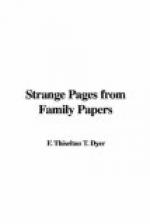It has been noted, also, that the same thing is related of the brave but unfortunate Admiral Kempenfeldt, who went down in the Royal George off Portsmouth. During his proprietary of Lady Place, he and his brother planted two thorn trees. But one day, on coming home, the brother noted that the tree planted by the Admiral had completely withered away. Astonished at this unexpected sight, he felt some apprehensions as to Admiral Kempenfeldt’s safety, and exclaimed with some emotion, “I feel sure that this is an omen that my brother is dead.” By a striking coincidence, his worst fears were realised, for on that evening came the terrible news of the loss of the Royal George.
Whenever any member of the family of Kirkpatrick of Closeburn, in the county of Dumfries was about to die—either by accident or disease—a swan that was never seen but on such occasions, was sure to make its appearance upon the lake which surrounded Closeburn Castle, coming no one knew whence, and passing away as mysteriously when the predicted death had taken place, in connection with which the following singular legend has been handed down: In days gone by, the lake of Closeburn Castle was the favourite resort during the summer season of a pair of swans, their arrival always being welcome to the family at the castle from a long established belief that they were ominous of good fortune to the Kirkpatricks. “No matter,” it is said, “what mischance might have before impended, it was sure to cease at their coming, and so suddenly, as well as constantly, that it required no very ardent superstition to connect the two events into cause and effect.”
But a century and a half had passed away, when it happened that the young heir of Closeburn Castle—a lad of not quite thirteen years of age—in one of his visits to Edinburgh attended at the theatre a performance of “The Merchant of Venice,” in the course of which he was surprised to hear Portia say of Bassanio that he should
“Make
a swan-like end,
Fading in music.”
Often wondering whether swans really sang before dying he determined, at the first opportunity, to test the truth of these words for himself. On his return home, he was one day walking by the lake when the swans came sailing majestically towards him, and at once reminded of Portia’s remark. Without a moment’s thought, he lodged in the breast of the foremost one a bolt from his crossbow, killing it instantly. Frightened at what he had done, he made up his mind it should not be known; and, as the water drifted the dead body of the bird towards the shore, he buried it deep in the ground.




